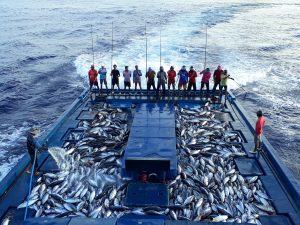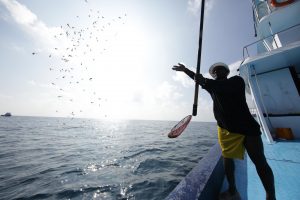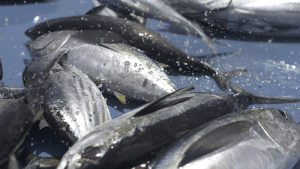The International Pole & Line Foundation – Maldives (IPNLF) and project partners Safety Net Technologies (SNTech) kicked off baseline data collection in the Maldives for a innovative project exploring low-impact alternatives to using live-bait by testing the potential of novel stimuli to elicit a feeding response in skipjack tuna and conserve live-bait resources, through the UK Government’s (DEFRA) Darwin Initiative Innovation Grant.
The two year project seeks to experiment with combinations of stimuli such as light, sound and olfactory stimuli to elicit a feeding response in schools of skipjack tuna and trial these treatments in commercial pole-and-line fisheries in the Maldives.
If successful in eliciting and maintaining a feeding response in skipjack tuna in a commercial pole-and-line fishing setting, the innovations would reduce the amount of live-bait required in pole-and-line fishing operations which in turn will have huge impacts for the conservation of livebait resources, the carbon footprint of pole-and-line fisheries as well as the operational efficiency of the vessels. In addition, these innovations could allow the development of low-environmental-impact pole and line fisheries in other geographical areas where availability of live-bait is a constraining factor, such as Cabo Verde or Senegal.

 Fishing operations in the Maldives use baitfish to attract tuna and to elicit a feeding response for fishers to hook tuna one at a time. Vessels and fishers are responsible for catching their own baitfish, usually starting their fishing trips in the evenings, staying out all night, while sleeping bits in between before turning to open sea to locate schools of tuna. The baitfish stocks in the Maldives are monitored and managed, including the collection of information on species, locations, and catch volumes help conservation and management and drive management policies, however, to bypass the process of catching baitfish will have a tremendous and positive impact on the lives of the Maldives fishers and will lead to socio-economic benefits such as;
Fishing operations in the Maldives use baitfish to attract tuna and to elicit a feeding response for fishers to hook tuna one at a time. Vessels and fishers are responsible for catching their own baitfish, usually starting their fishing trips in the evenings, staying out all night, while sleeping bits in between before turning to open sea to locate schools of tuna. The baitfish stocks in the Maldives are monitored and managed, including the collection of information on species, locations, and catch volumes help conservation and management and drive management policies, however, to bypass the process of catching baitfish will have a tremendous and positive impact on the lives of the Maldives fishers and will lead to socio-economic benefits such as;
Fishers can spend more time with their families at home, increasing a work-life balance,
Reducing use of fuel, lowering the carbon footprint of the pole-and-line fishing fleet of the Maldives,
Cost reductions and operational efficiencies, improving the standard of living,
Safety at sea; eliminating diving for baitfish that puts fishers at the most physical risk of their daily operations,
Supporting conservation and management of coral reef resources by mitigating negative ecosystem impacts by reducing the total removal of livebait from coral reef ecosystem.
The Darwin Innovation grant is a new Darwin grant focused on funding projects that are trialling novel approaches/technologies that, if proven and scaled, could produce positive impact for biodiversity protection or poverty reduction aims. IPNLF Maldives are the first cohort and Darwin are funding the project for two years to explore innovative use of technology to reduce the use of baitfish in pole-and-line fisheries. IPNLF proposes to do this by exploring combinations of visual, auditory and olfactory stimulation, including LED lights, underwater soundscapes and byproducts of fish processing. We have partnered with technology partner Safety Net Technologies (SNTech) who will be trialling their Pisces underwater lights and AI integrated underwater cameras for data collection.
The first field exercise for data collection started in August 2022, with the IPNLF team heading to the Southern Atolls of the Maldives to work with one of the state-of-the-art Maldivian pole-and-line vessels. The team designed and engineered a camera rig capable of filming the behaviour of skipjack tuna underwater when they chase the pole-and-line vessel to feed on livebait thrown by the crew – the baseline condition. We aim to use the cameras to observe how skipjack responds to the novel stimuli and compare this response to the use of baitfish at a later stage.
 The first challenge encountered during the baseline data collection was engineering the camera rig to withstand the enormous force from the drag created by the 1300hp engine shifting the pole-and-line vessel through the water.
The first challenge encountered during the baseline data collection was engineering the camera rig to withstand the enormous force from the drag created by the 1300hp engine shifting the pole-and-line vessel through the water.
It took three modifications of the rig before the team succeeded in capturing underwater footage without the rig being wrenched out of the water by the drag. Furthermore, the main contention was unpredictable weather and poor baitfishing and tuna fishing conditions caused by the shift of seasons. Baseline data collection will be completed by the fourth quarter of 2022 and the first experimental trials are due to commence in February 2023 with the SNTech team and project team members flying to the Maldives.
A series of experimental trials will be conducted using different combinations of light, soundscapes, chemical/olfactory stimulation from fish factory byproducts and artificial lures to try and elicit a feeding response behaviour in skipjack tuna. The response will be compared against the baseline of skipjack feeding on livebait as traditionally thrown by the pole and line vessels.
If a certain combination of stimuli can elicit a feeding frenzy response in skipjack, comparable to that of chumming with live-bait, then fishers may be able to reduce the amount of livebait used or even better, remove the need for livebait entirely. If the project team succeeds in finding the magic combination, then the next aim will be to share with as many fisheries stakeholders as possible and make the technology as accessible and replicable.
